Customise Training Schedules for Success in FM21
Training can often be overlooked in Football Manager. It’s understandable; it doesn’t have the glitz and glamour of developing a groundbreaking tactic, nor does it give the same adrenaline rush you get when making a top-quality signing. Nonetheless, it’s every bit as vital to your team’s success. Without the right training schedule, that revolutionary tactical style you’ve developed won’t work as it should and you won’t get the most from your stars. Rock’s End FM details how you can maximise training by developing your own custom schedules.
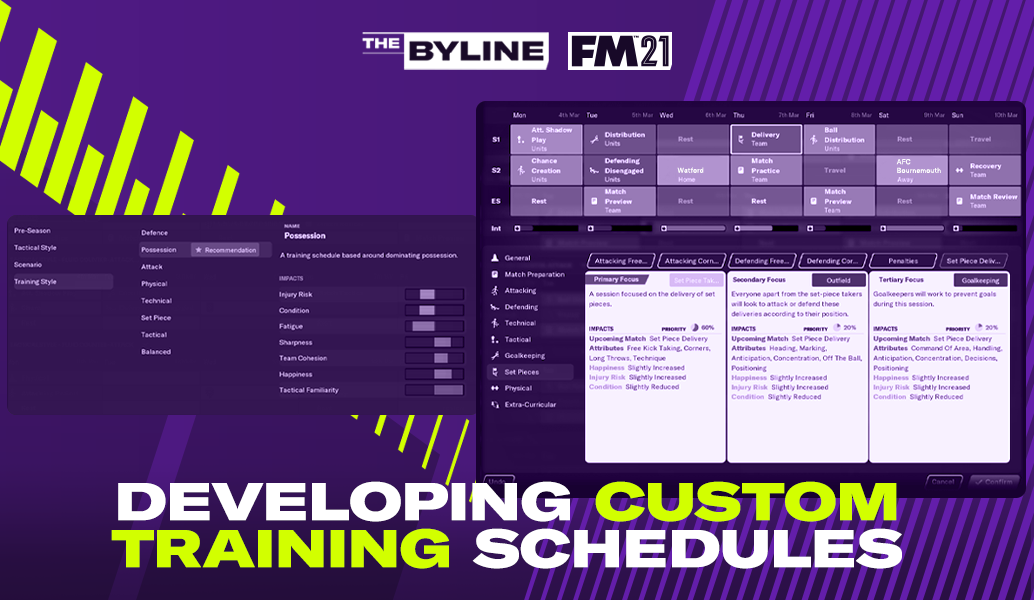
Why should you take control of your general training?
Training, like most things in FM21, can be delegated to your staff, letting you focus on the things you’re most passionate about. So, why should you take training back under your control?
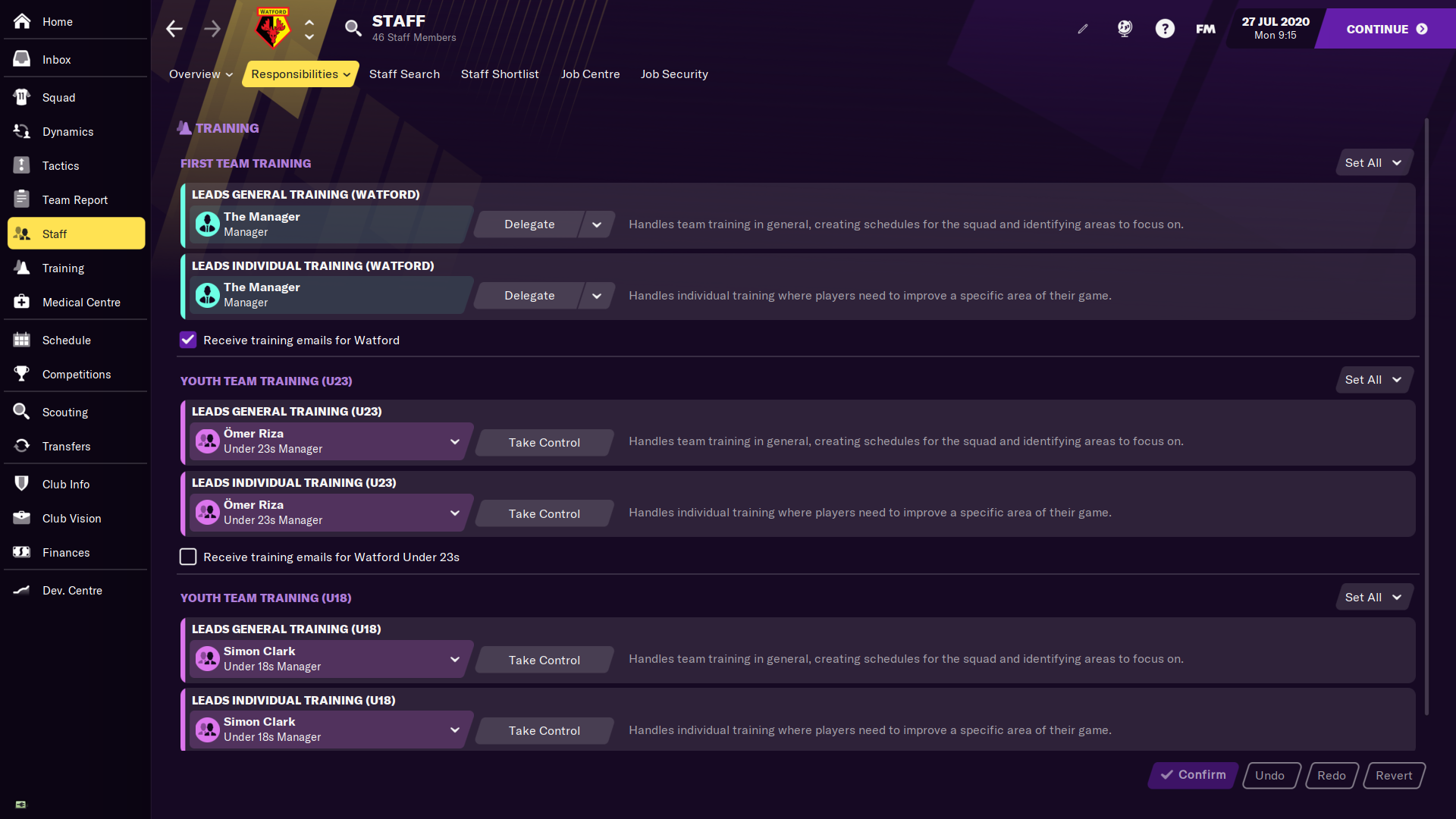
Well, if you'll pardon an eccentric metaphor, think of it as a nice suit. There are plenty of excellent, designer suits you can buy off the rack without any more effort than trying them on… but there’s a reason the really expensive stuff is tailor-made. Much like a bespoke suit, a custom set of training schedules will fit your team’s needs perfectly.
Designing your Custom Schedules
The first thing to consider when designing your own training schedules is that no key fits all locks. With any given team, you’ll need a set of different schedules to address different aspects of the game. You’re also going to need different routines to meet the demands of differing stages of the season. You can create a new training schedule at any time by going to the Schedules tab under the Training screen and selecting Create new schedule.
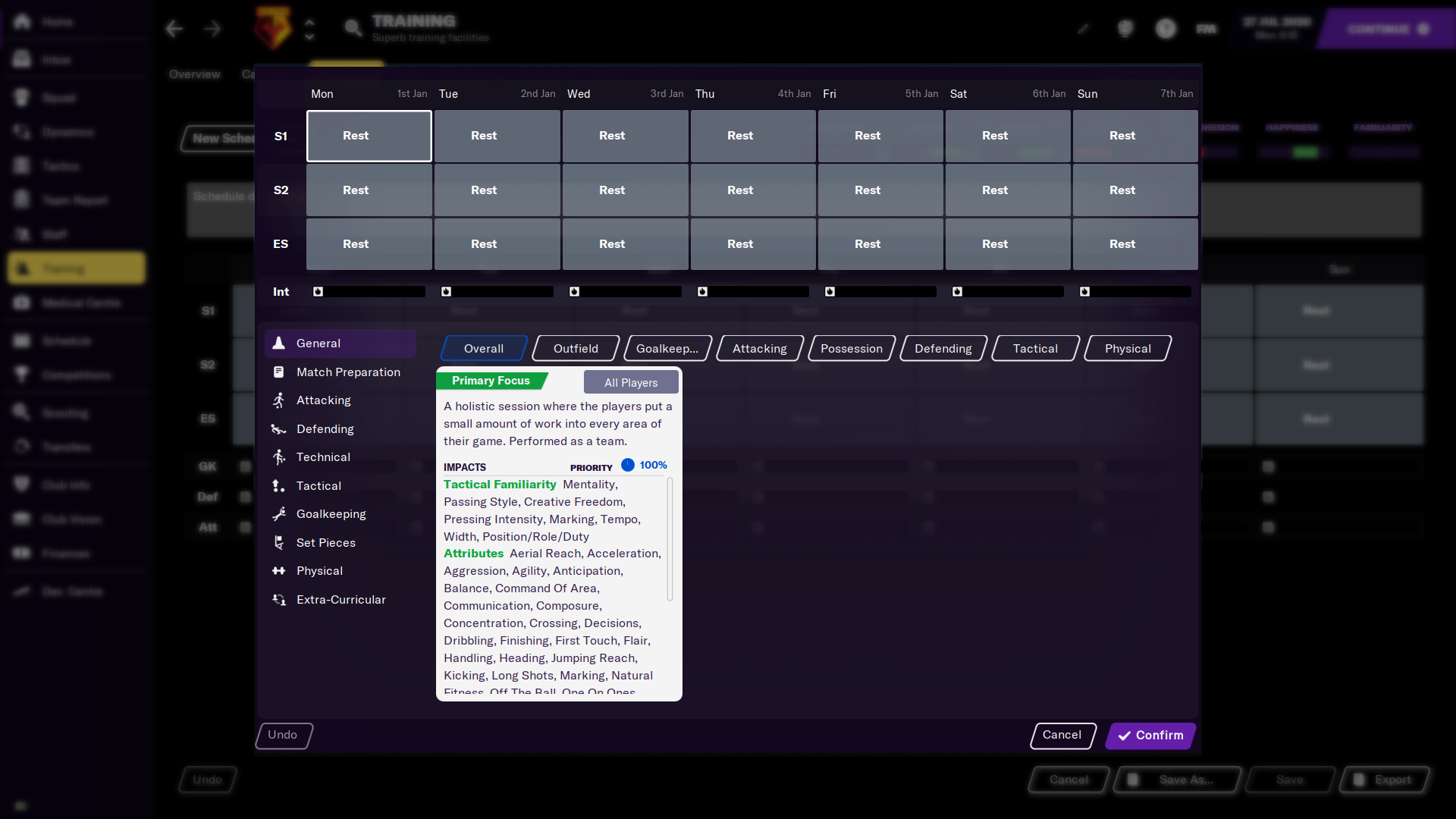
Your team’s General Training is divided weekly, with each day comprising two core sessions and one extra session. Extra sessions are great (almost a necessity) for development, but they greatly increase the fatigue and injury risk suffered by players, so a balance must be struck. The demands on players will vary from session to session, so always check the meter at the bottom of each day to ensure you’re not overworking them.
When organising these schedules, you need to find a method that suits you. Personally, I align them with the different phases of play – attack, transition into defence, defence and transition into attack. However, any style could feasibly work.
Each schedule will have a different focus depending on how you’ve structured them but something I like to do is always work compatible aspects of the game with both the attacking and defensive units. For example, on my attack phase schedules, my attacking unit is expected to work on their Chance Creation and Ball Distribution; the defenders, in turn, look to work on their space covering and defensive shape as they practice Defending Disengaged.
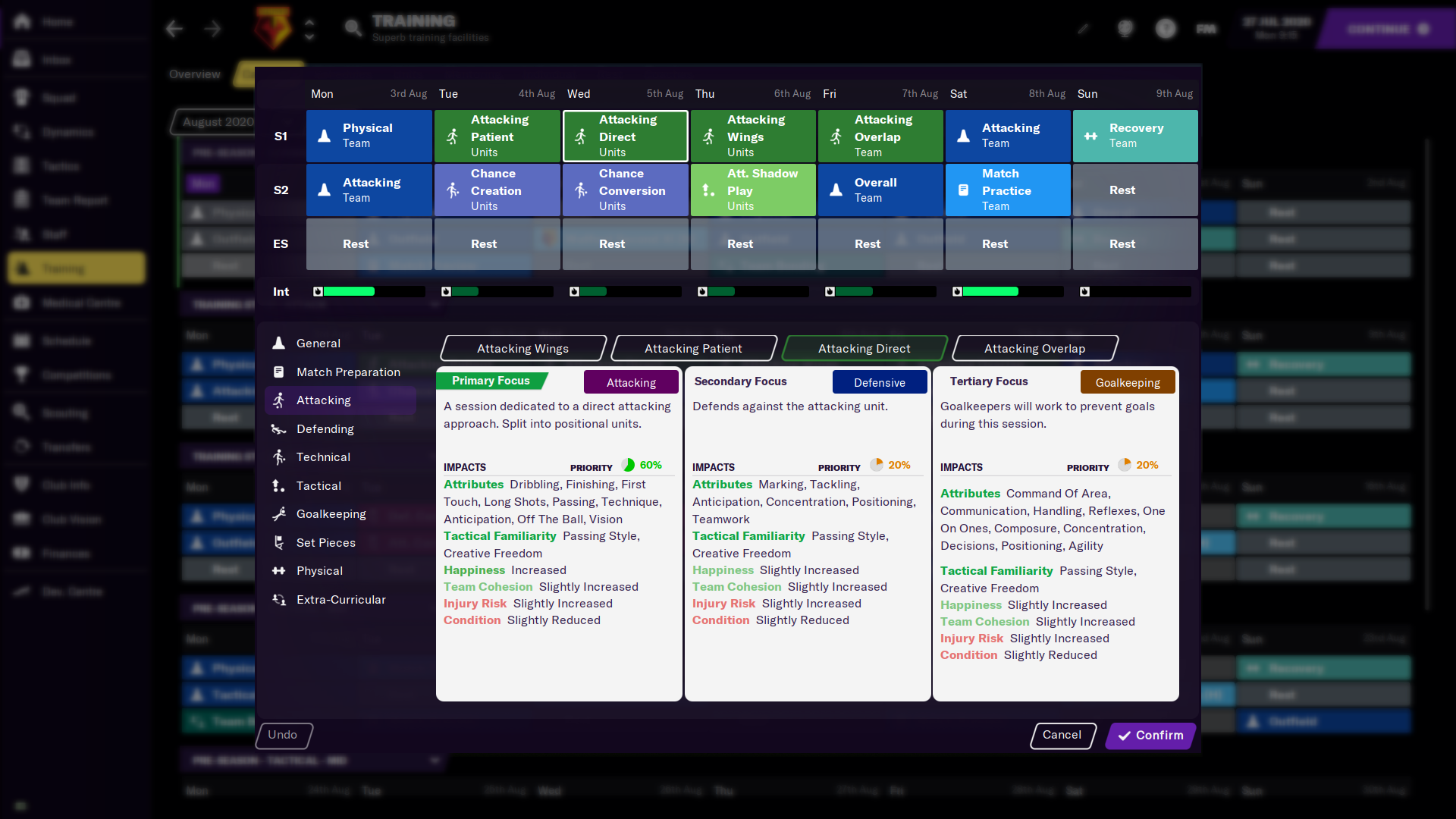
It’s also important to set up the training units and coaching assignments correctly beforehand. This means you’re extracting the most value from the training sessions and working towards objectives in the most effective way. As I mentioned at the start, there are two key factors to consider when creating your schedules: the style of football you’re looking to play and time of the season you’re in.
Style of football
This is less about the instructions per se and more about the driving principle behind the style your team is looking to play. Your training schedules should be comprised of sessions that work on Attributes necessary for said style. In order to do this, you need to look at the sessions available and consider which will most help your players improve and the team to play the way you want. Pay attention to which unit each session focuses on, and what the other units do at that time.
A couple of general pointers – try to avoid repeating sessions between schedules and don’t be afraid to throw in the odd session that looks out of place. Doing the former will maximise the benefit of each session and prevent too much repetition, while the latter helps to develop a comprehensive skill set among your players that will help them through tougher situations.
If you’re looking to do any individual training, either to teach a player a new position or to work on refining certain key Attributes, remember to look for sessions that have secondary units working on their individual roles. Goalkeeping sessions are great for this; I try to always have a session a week working with the goalies. This not only reduces any issues with unhappiness, but lets everyone work on their match duties. Match Practice sessions are also great for this.
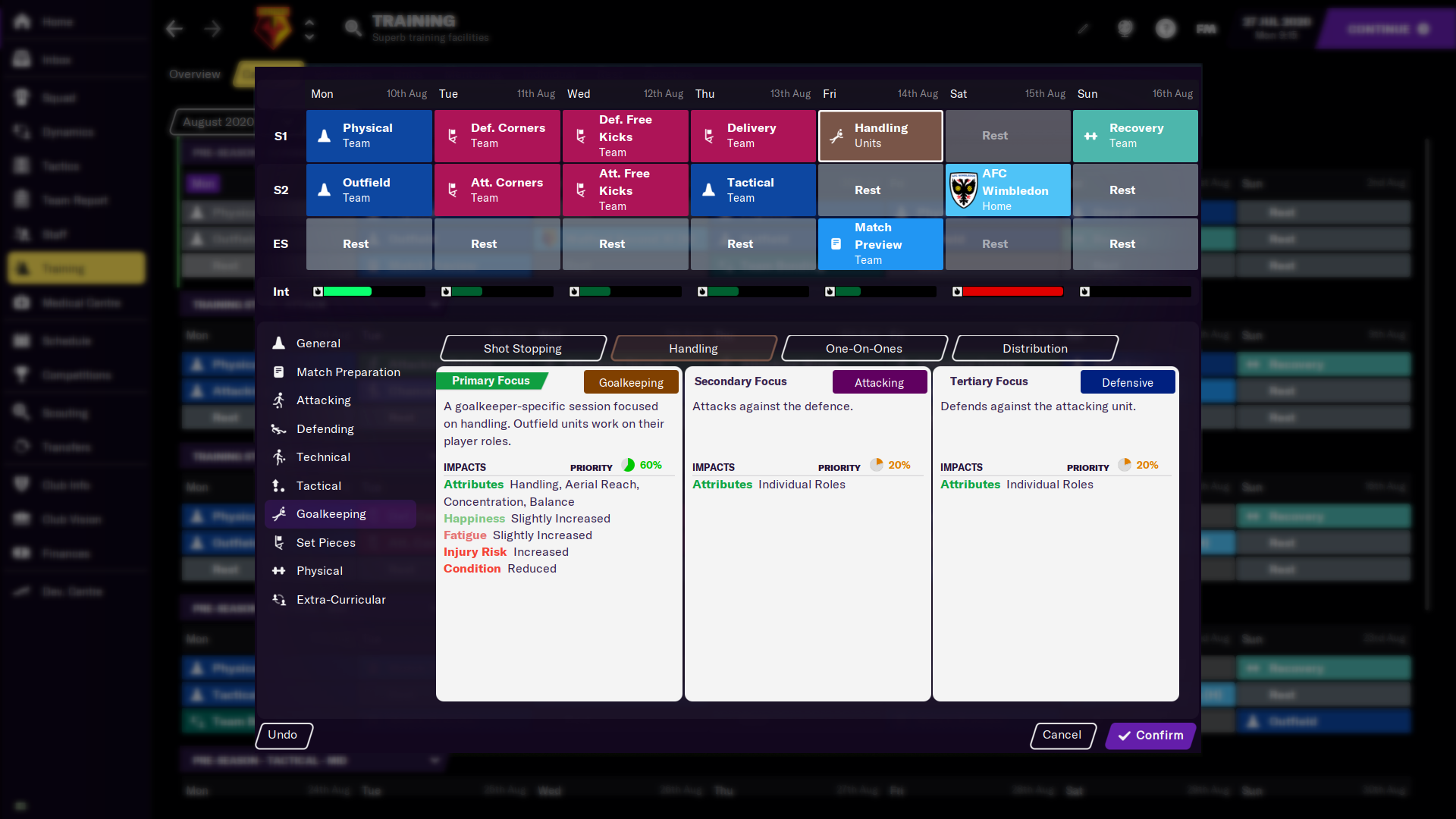
I find it useful to have clear training objectives ahead of each season, and these are usually determined by how your squad shapes up. Do you have a large contingent of young players in the team? If so, perhaps the focus should be on work-heavy sessions that will assist with their overall development. Did you add a lot of new players to the squad who are going to be seeing heavy minutes? In that case maybe you should work on building up tactical familiarity and team cohesion - Match Preparation and Extra-Curricular sessions are great for this. Do you have an older, settled team aiming at one last hurrah? It may be the case of looking not so much to develop new skills but to sustain sharpness and fitness while avoiding injuries, keeping extra sessions and heavy physical workouts to a minimum. Look at your team and try to figure out what your approach needs to be.
Time of the season
A great deal of what you work on with your team should be dictated by the part of the season you’re in. The demands of pre-season are not the same as those of the final few weeks. Different moments require different approaches.
Pre-season
Pre-season is a vital part of each campaign. It can set up you up for a successful season or one full of cruel disappointments in the big moments. When your players return from their holidays they will be fresh with no fatigue, but they’ll be also low on match sharpness. It’s therefore important to focus on Physical sessions to start building up long-term fitness. In general, it’s better to do intensive sessions in the first couple of weeks and then transition into combining them with more football-oriented workouts.
Another key part of pre-season is tactical familiarity. You should focus on using sessions that build up familiarity in conjunction with playing friendlies, particularly if you’ve had a lot of players coming and going over the summer or if you’ve made big changes to your tactical approach.
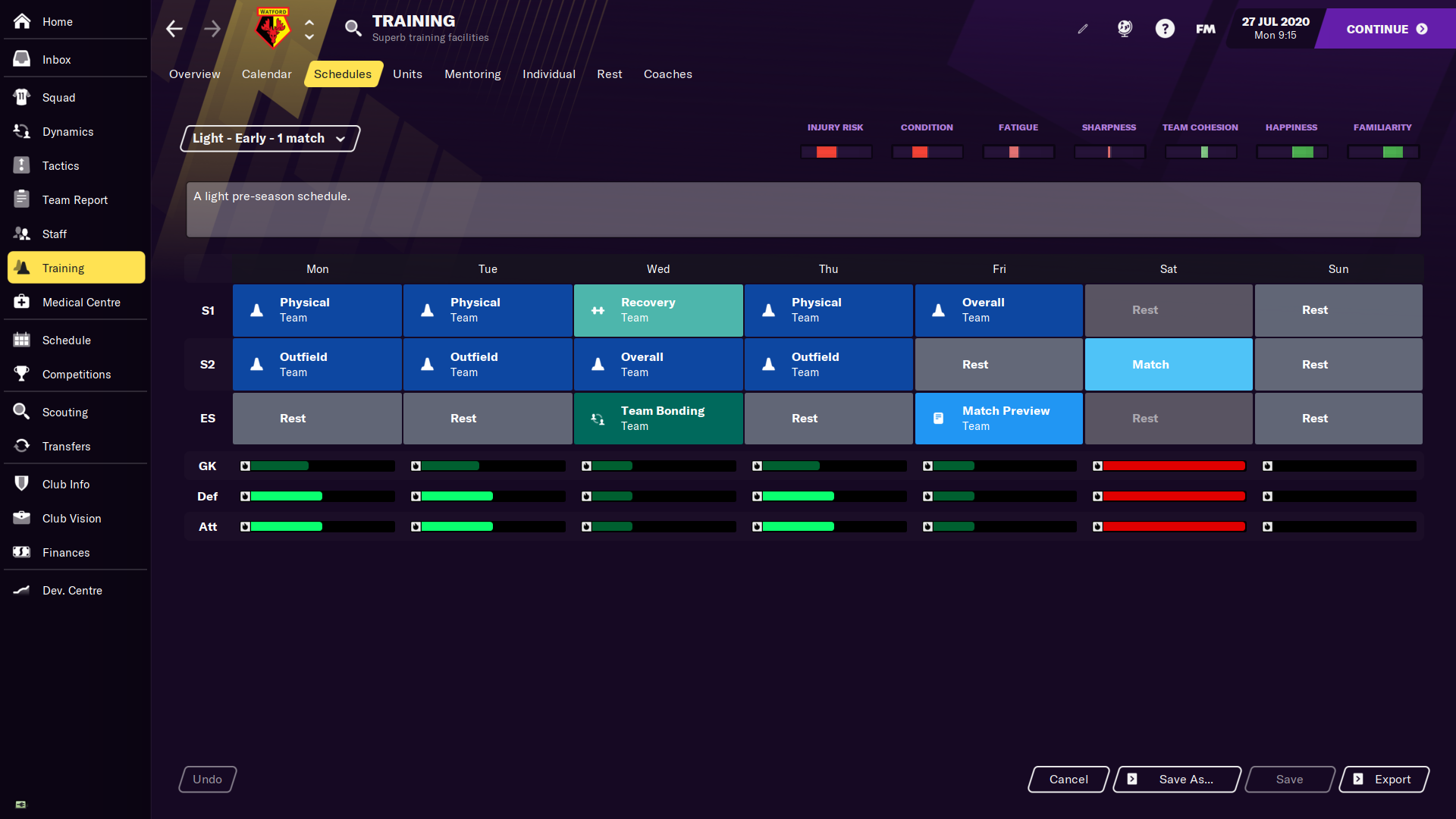
Early to mid-season
Once the season is up and running you need to shift to your main training schedules. What those are and what they focus on will largely be decided by the objectives you set when planning them; in general, this is the ‘no pain, no gain’ part of the year from a development and progress standpoint.
As a rule of thumb, you should move away from intense, fatigue inducing sessions at this stage. I try to keep Physical sessions to a maximum of once or twice a week. It’s also when you should be looking into Match Preparation and Set-Piece sessions in order to maximise your team’s performance on matchday.
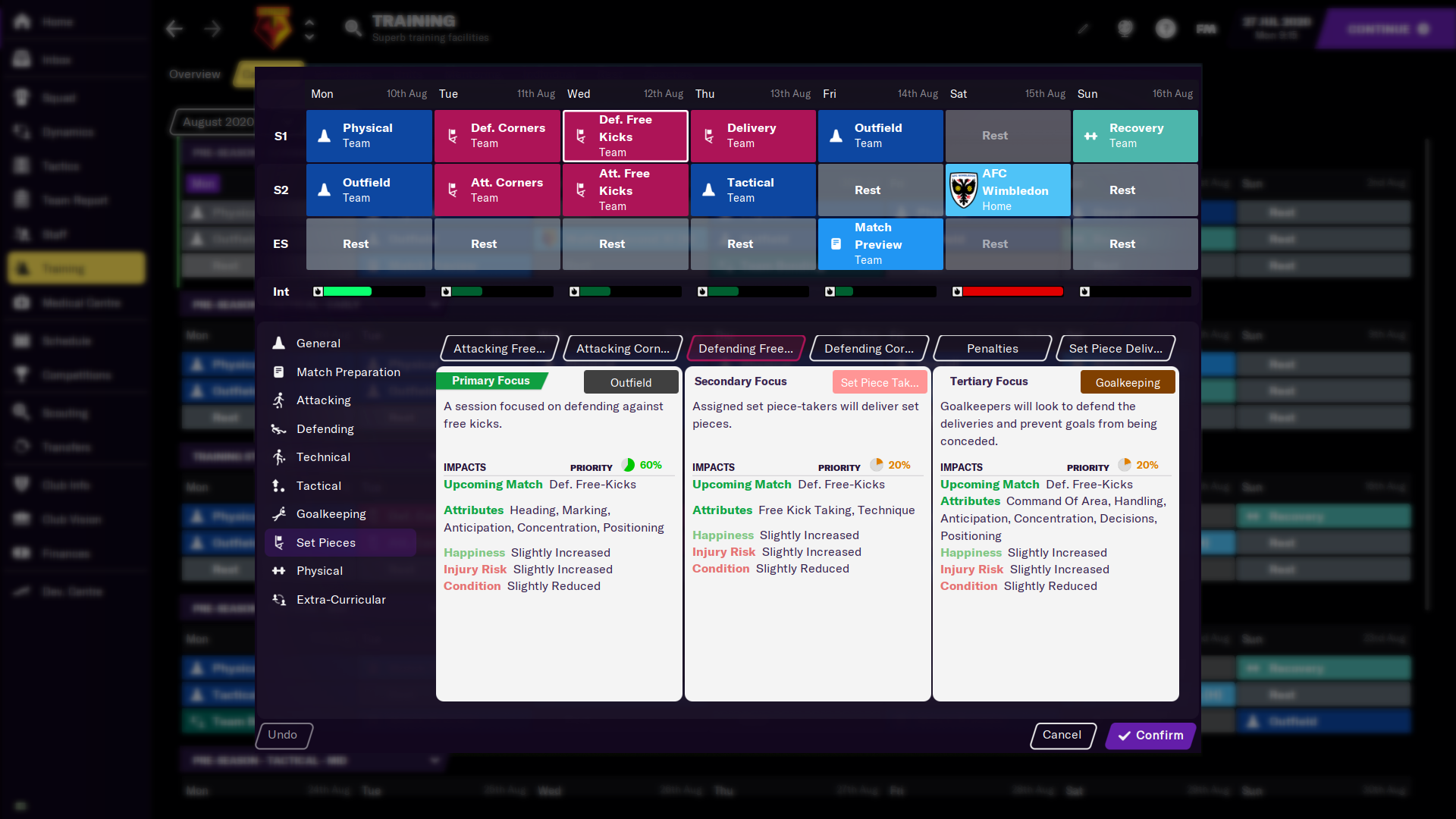
In addition, you should look out for multiple fixture weeks and plan accordingly, reducing the intensity of the schedule to allow your players proper rest. An overworked team is every bit as bad as an out of shape one.
Late Season
As the season progresses to its conclusion, you should be looking to change your sets as the focus shifts once again. Now, instead of concentrating on developing your team, you’re looking to keep your team in shape and maintain the progress made during the season. Players have gained fatigue in the long season, so it’s of no use to push them now.
Furthermore, it’s also important to focus on avoiding injuries. The risk of serious injuries is high after a long season of work, with many miles on their legs both from training and playing time. Lowering the intensity of training will be key, and the use of Extra Sessions should be minimal to reduce exhaustion and the risk of a clumsy tackle or an extra effort depriving you of one of your stars for those end-of-season games with a lot on the line…
Taking control of your team’s General Training can seem a daunting task at first, but the rewards you can reap greatly outweigh the initial headaches. Hopefully this guide helps you take the reins on training and design your own custom schedules.

















